
Éxitos de Gloria Estefan is the first compilation album released by American recording artist Gloria Estefan, but is the second solo release and the 13th overall, released in 1990. In 1999, the CD was re-released in the US as 20th Anniversary.
Argentina Sono Film S.A.C.I. is an entertainment company based in Buenos Aires that was one of the most important studios during the Golden Age of Argentina cinema of the 1930s–1950s. In its current format, it serves as a production and distribution company.

Puerto nuevo is a 1936 Argentine tango musical, drama film directed by Luis César Amadori and Mario Soffici during the Golden Age of Argentine cinema. It was written by Amadori and Antonio Botta. The music was performed by Uruguayan musician Francisco Canaro. Club Atlético Puerto Nuevo, founded in 1939, takes its name from the film.
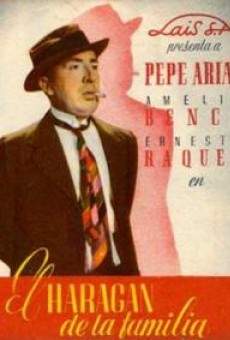
El Haragán de la familia is a 1940 Argentine comedy film of the Golden Age of Argentine cinema directed by Luis Cesar Amadori, who also co-wrote it along with Ivo Pelay.

Brother Joe is a 1941 Argentine comedy film of the Golden Age of Argentine cinema.
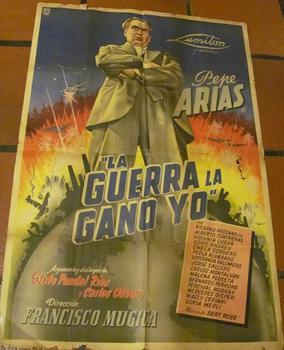
La Guerra la gano yo is a 1943 Argentine comedy film.
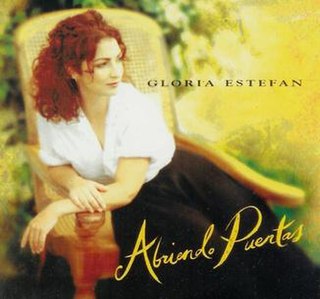
Abriendo Puertas is a 1995 album released by Gloria Estefan. It is her sixth studio album as a soloist and second Spanish language album released.

Miguel Ángel Lauri, known in France as Michel Lauri, was a footballer, he played for Estudiantes de La Plata. Born in Argentina and of French descent, Lauri represented both the Argentina national football team, and France national football team.

Orgullo, Pasión, y Gloria: Tres Noches en la Ciudad de México is a live video and album by the American heavy metal band Metallica, recorded at Foro Sol, Mexico City, Mexico, on June 4, 6 and 7, 2009, during the World Magnetic Tour. It was supposed to be released in Latin America only, but it is also available in Northern Europe. The record was released in four formats:
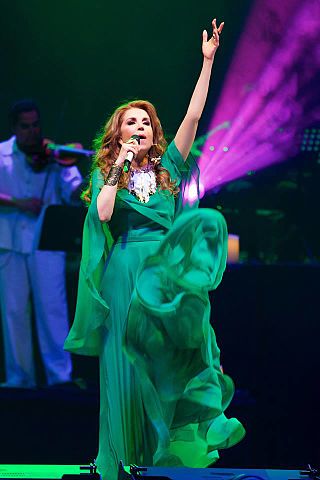
Guadalupe Pineda Aguilar is a Mexican singer considered one of Mexico's grassroots musical icons. She is a recipient of the Latin Grammy Lifetime Achievement Award and a multi-Latin Grammy nominee, she has released more than 30 albums during her career covering various styles of music with sales over 14 million copies worldwide. In 1984, she recorded her breakthrough hit "Yolanda", also known as "Te Amo", composed by Pablo Milanes, selling more than 1.5 million copies. She primarily sings in Spanish, but has also sung in French, Italian, English, and Hebrew. She has been called the “Queen of Bolero”, but has also sung ballads, mariachi, tango, ranchera, and opera. Pineda has performed all over México, Latin America, and Spain, as well as in Europe and North America.
Para vestir santos is an Argentine comedy-drama television miniseries directed by Daniel Barone, which premiered on El Trece on 21 April 2010 and consists of thirty-six episodes. It stars Celeste Cid as Malena, Griselda Siciliani as Virginia and Gabriela Toscano as Susana, three sisters struggling after their mother's death.

Las seis suegras de Barba Azul is a 1945 black and white Argentine comedy film directed by Carlos Hugo Christensen.

Pepe Arias was an Argentine actor and comedian, notable for his work during the Golden Age of Argentine cinema.

La señora del intendente is a 1967 Argentine comedy film directed by Armando Bó and starring Isabel Sarli and Pepe Arias. The film had a sequel "Una Viuda descocada" (1980), which was Bó's last film.
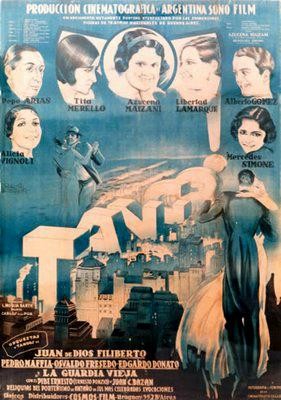
¡Tango! is a 1933 Argentine musical romance film, the first film to be made in Argentina using optical sound technology Many existing stars of the Argentine stage and radio appeared in the film, but its success was limited due to poor sound quality and weak acting. ¡Tango! established a formula that would be used by many subsequent tango films.

Juanita Martínez was an Argentine vedette, who starred in revue shows. She also worked as a film, television and theater actress. She was the wife of actor Jose "Pepe" Marrone and often performed with him.

Adrián Cuneo (1912–1995) was an Argentine film actor. He co-starred with the comedian Niní Marshall in a number of films.

Aída Olivier was an Argentine dancer, vedette and actress of cinema and theatre.

Victoria Cuenca was an Argentine film actress during Argentina's Golden Age of cinema, as well as a theatre actress and a vedette.

Haydée Bozán was an Argentine actress, chorus girl, vedette, and businesswoman. She was the sister of actresses Sofía Bozán and Elena Bozán, and cousin of Olinda Bozán.

















